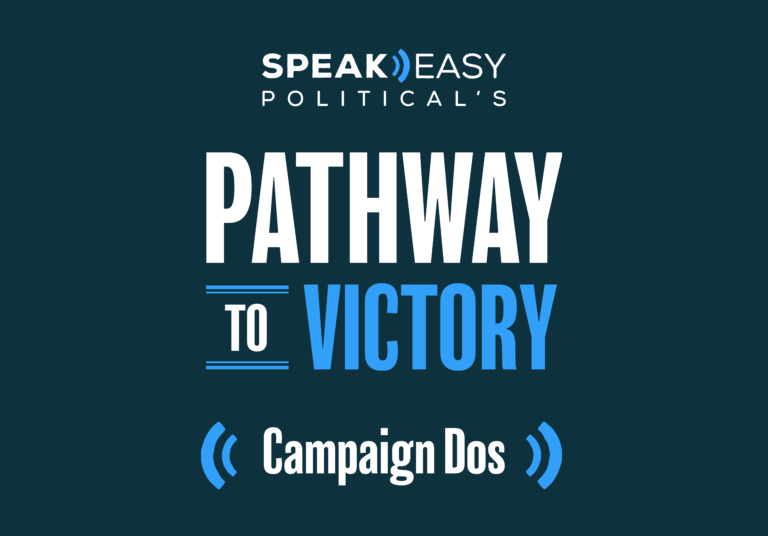Are there free ways to be heard?
They take time, but yes, there are some free ways to be heard. Most importantly, make sure you are listed on all the free services that host candidate material — SmartVoter from the League of Women Voters is a key example. Make sure to take advantage of the opportunities your local newspaper provides, as they may allow you to submit one or two opinion pieces. Letters to the editor from supporters should not be overlooked. Leverage your social media platforms — use your friends, family, fans, and supporters to share your content to get free organic traffic without having to spend money to push it out.
Should I go to all events?
If you have a chance to speak to a decent size audience, you should go to an event, so long as it isn’t going to take you all day. If you can’t speak, but there is time to mingle with a lot of people, then yes, do that too. But if you start seeing the same people over and over again, you are going to too many events. Your time could be better spent walking the precinct and meeting new voters.
House parties.
Yes, you probably should think about a house party program. In the age of COVID, this will likely be virtual, so it’s really time to get creative. The goal of a house party should be to help grow your team, raise funds for your campaign to win, and ensure a fun time for guests to support you.
- STEP 1: Schedule several hours for your event and have a specific fundraising goal in mind.
- STEP 2: Mail or email an invitation to everyone on your targeted list several weeks out. Ask the host to invite all of their friends, and consider including likely voters who live near the event.
- STEP 3: Follow up every invitation with a personal call. Ask those who cannot attend the house party to make a donation.
- STEP 4: Set the atmosphere to be welcoming and friendly. At your house party, provide light refreshments and snacks. On Zoom, send some fun campaign-related backgrounds ahead of time. Make sure to prominently feature the mechanisms for donating and remind your guests how important their support is on your way to winning.
- STEP 5: Remember to say “Thank you!” to everyone who came to your event. Thank them by phone, email or letter.
Should I attend debates?
Yes, you should. It is a great way to get your message out, particularly for a first-time candidate. You probably should be proactive and ask community organizations like the League of Women Voters or your local newspaper to host debates. Make sure to practice. Most debates have a few minutes of opening remarks and a few minutes of closing remarks. Write these down and practice just like you practiced your rap. In most cases, this will be a modified version of your basic campaign message. Go through a detailed list of possible questions or key issues affecting your community, and make sure that you have clear answers for when those questions are asked. But make sure to practice!
Remember that your campaign is not like a presidential campaign.
We’ve noticed many first-time candidates can repeat dialogues word-for-word from The West Wing and have read numerous books about presidential campaigns. Please put all that pomp and circumstance out of your head. Your campaign is nothing like a presidential campaign. Most political campaigns are nothing like a presidential campaign. Why? Three reasons:
- First, scale. Presidents can’t and don’t walk precincts and call voters directly because the scale makes that impossible. You can and must ask voters directly or you probably won’t win.
- Secondly, interest level. Presidential campaigns are one of the few campaigns where voters do pay attention. In nearly every other campaign, it is harder to capture the attention of voters.
- And finally, your budget. You won’t have a staff of hundreds of experts and helpers. You have your trusty walk list, your comfortable shoes and mask, your firm belief in your message, and a positive attitude.
Know how to say “No.”
There are going to be times when it is required. Don’t be afraid of it. When the big donor comes to you and says, “I will support you but only if you promise to support ________ (insert some special ask here),” you have to be able to say “I am sorry, but no — I can only promise to do my best every day.” When your friend’s kid needs a job and he wants one on your campaign, if you don’t need him or he can’t do the job — just say “No.” Better to be clear and up front right away. People don’t thank you for “Maybe.” Only for the satisfaction of “Yes” or the clarity of “No, sorry.”
PRO TIP: Take copious notes. If Thelma on Elm Street mentions that her granddaughter was just accepted to UCLA, write it down. If she’s concerned with cuts to Medicare, take notes. In four months when you’re back at Thelma’s door during the GOTV phase of your campaign, you’ll be grateful you have a few extra reference points. And if you don’t write it down, trust us — you will not remember.
Looking for more information about what it takes to run for office? Download our e-book designed to walk candidates through the process of running – and winning – their first political campaign. And be sure to check out more from our Pathway to Victory series!




